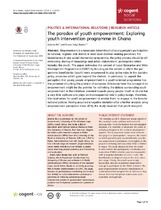The paradox of youth empowerment: Exploring youth intervention programme in Ghana
Abstract
Empowerment is a necessary determinant of young people’s participation
in national, regional and district or local level decision-making processes. For
inclusiveness in any social intervention programme, the policy process should be allembracing
sharing of knowledge and active stakeholders’ participation which
includes the youth. This paper delineates the context of Local Enterprise and Skills
Development Programme (LESDEP) by focusing on the extent to which the programme
beneficiaries (youth) were empowered to play active roles in the decision
policy processes which goes beyond the rhetoric. In particular, to unpack the
perception that young people empowerment in a youth-oriented programme has
the potential of curbing the problem of exclusion. Inferences from the concept of an
empowerment might be the premise for rethinking the debate surrounding youth
empowerment in the initiatives oriented towards young people. Youth in Ghana has
a very little aptitude and plays an inconsequential role in policy design; therefore,
the need arises for youth empowerment to enable them to engage in the broader
national policies. Having assumed a negative deviation after a further analysis using
empowerment perception index (EPI), the study revealed that youth marginal
involvement and consultation in decision making cannot constitute empowerment
to any degree. Given the crucial implications of this for youth policy implementations
at the national as well as subnational level, the paper recommended some
pathways for ensuring youth empowerment in youth-oriented programmes in
Ghana.

